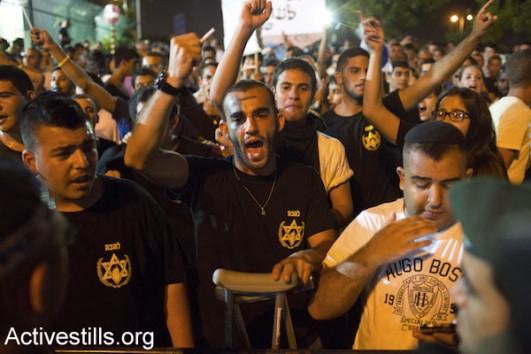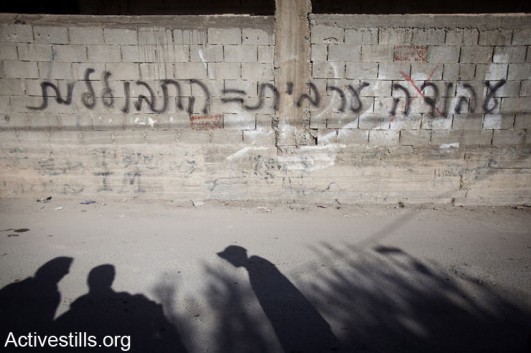David Mizrahi, once a vocal anti-Arab hatemonger, makes amends in a heartfelt Facebook post, and begins preaching tolerance and acceptance. In the current climate in Jerusalem, that is a brave and commendable thing to do.

David Mizrahi was once a prominent member of La Familia, a notorious Jewish supremacist chapter of the Beitar Jerusalem fan club.
Three years ago, he famously refused to shake hands with professional Arab footballer Mohammed Ghadir. But on Sunday, he published the following on Facebook:
Three years ago I arrived at Mohammed Ghadir’s home, accompanied by a Channel 2 TV crew. You can still see the footage on YouTube. Mohammed showed me great hospitality, but I was very rude to him and refused to shake his hand. It was a time I was full of racism and hatred of Arabs, leftists, and anyone who thought differently.
The following year I worked in a packing warehouse, where I met Arabs for the first time and realized they weren’t monsters, like I had thought. Most of them want to live normal lives, have a job and earn a living, and that their lives aren’t easy at all. I realized life wasn’t black and white. For some time afterwards, Bnei Sakhnin [Ghadir’s club] fans used to lift banners bearing my name.
I will never forget the Arab bus driver who took us from [the settlement of] Ma’ale Efraim to Jerusalem, and how he gave us cold drinks on a hot day. My mother was so happy. Yes, he was an Arab but we talked about our lives and realized we all had pretty much the same problems.
The first time I ever met an Arab was when I was 23.
Jerusalem is divided between different people – leftists and rightists, secular and religious – these definitions erect walls and restrict our humanity.
At the end of the day, when you talk to someone on the level and do it genuinely you realize that we all have a lot in common, even when we disagree with each other, which is fine. They look different and they think different, but we must respect each other, we are all the sons of one god.
I then shed all my prejudice and the preconceptions that I had, having grown up in Jerusalem during the Second Intifada, having seen blown-up buses and having thought every Arab was a terrorist. Many times in my life I incited and acted against Arabs.
And today, three years on, I’m coming full circle. I’m going to meet with Mohammed Ghadir, shake his hand talk to him. I’m the happiest man alive.
I’ve recently started speaking against racism and for love and tolerance. Many eyebrows were raised. I was harassed along the way, and many are still annoyed with me.
Bu when I see kids who, thanks to me, choose love over hate, I couldn’t be happier. I have made lovely Arab, religious, secular, ultra-Orthodox friends, — really of all kinds. I’m trying to shed my prejudices and be sensitive, empathetic, loving and accepting. I’ve shed all the fears that I had. I’ve won.”
Later, after he met with Ghadir, he wrote another post describing the meeting as “one of the most emotional moments of my life.”

Not surprisingly, the post didn’t go unnoticed. Leftists were touched and congratulated Mizrahi; rightists were angry and critical. In his responses to both, Mizrahi was impressively tolerant. In truth, more than the original post, Mizrahi’s about-face was most felt in his responses to his comments.
When one angry critic asked him whether Ghadir sang the national anthem, Mizrahi answered: “I don’t expect him to sing ‘a Jewish spirit is yearning’ [a line from Hatikva, Israel’s national anthem] just like you wouldn’t expect me to sing ‘an Arab spirit is yearning’.”
When another wrote that the Arabs want to kick out all the Jews from Jerusalem, Mizrahi answered: “Relax, my friend, nobody is going to kick you or me out. In any event, Jerusalem is divided. I suspect that you’ve never been to the city’s Arab neighborhoods. It’s already divided. Jerusalem is sacred for all religions and we need to ensure freedom for all.”
Unsurprisingly, the moral clarity and political insight Mizrahi displays greatly surpasses many sectors of the Zionist center-left, who continue to swear by the “indivisible” Jerusalem and who take offense when Arab MKs walk out of the Knesset plenary hall when the national anthem is played.
While many on the left still devise the most effective ways to separate between Jews and Arabs, Mizrahi acknowledges that separation breeds ignorance and hate. And most importantly, while liberal Zionists continue to accuse the right and the settlers of “derailing Zionism” without recognizing their responsibility, Mizrahi’s premise is first and foremost to acknowledge his past behavior and take responsibility for it. I wish liberal Zionist leaders in this country were half the man he is.
It is tempting to be cynical, and look down on Mizrahi for discovering that Palestinians are people too, and that what they care about most is peace and security. It makes more sense to witness, with genuine admiration, how one young man extricated himself from the pressure of the racist agitators who can be found on every street corner in Jerusalem, and choose a different path.
As a Jerusalemite, a Mizrahi and peace activist, I choose the latter. Kudos, David Mizrahi.
This article was originally published in Hebrew on Local Call. Read it here.

